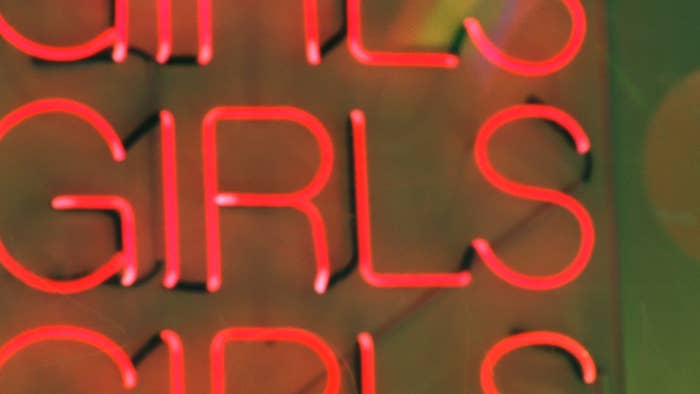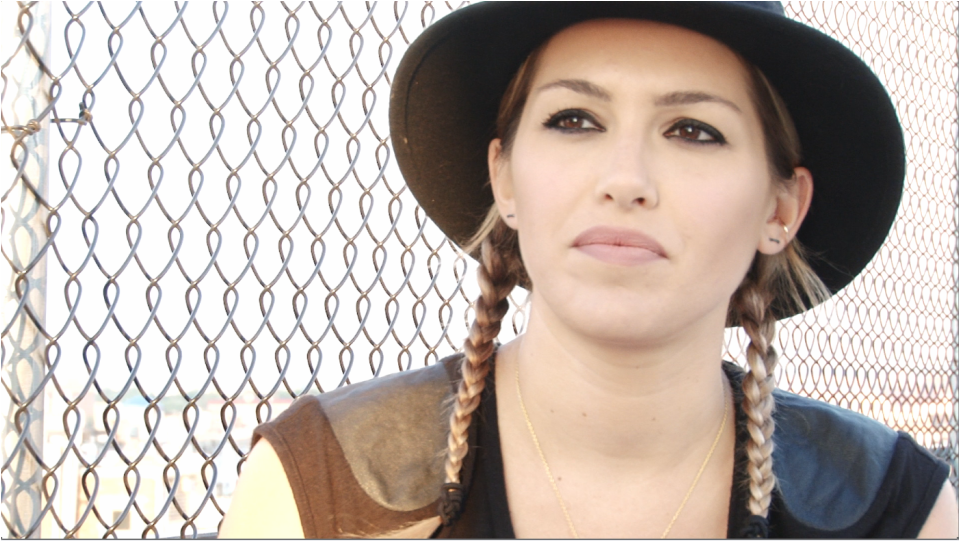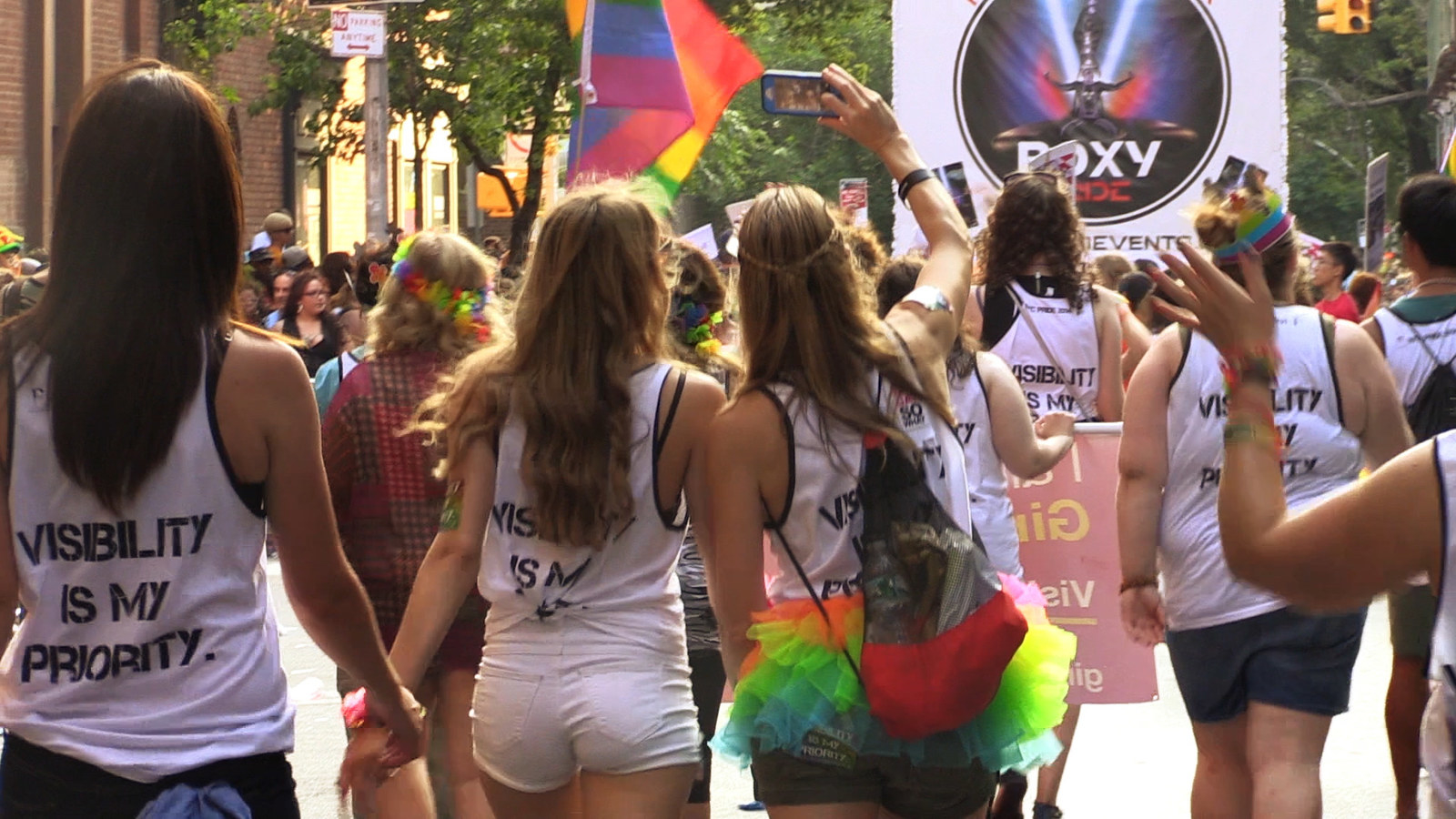I'M a lesbian, but you wouldn’t guess it just by looking at me. I’m usually wearing a skirt or a dress, and I only recently purchased my first flannel shirt. I wear makeup and love red lipstick. I don’t have short hair. And I have an impractically large number of Kate Spade handbags.
Most people have an image of what a gay woman looks like, whether it’s subconscious or acknowledged. And that stereotype is not me. Straight people assume I’m one of them, until I prove otherwise; some members of the LGBT community assume I'm straight.
I am a feminine lesbian and I feel invisible. Pushed to the side, glanced over, forced to prove myself again and again.

THERE'S a documentary playing at Sydney’s Mardi Gras Film Festival this month titled Girl on Girl. It’s made by American filmmaker Jodi Savitz, who for four years charted the lives of six women who identify as feminine lesbians.
They are aged from their twenties to their sixties and are of different ethnicities and cultural backgrounds, yet all share a common feeling of invisibility.
There’s Karen, the aspiring designer who was homeless as a teenager; Lyndi, an Air Force veteran who had kept her sexuality a secret; Ashleigh and Destini, parents to a toddler and trying to get pregnant again; and Lauren, who once appeared on the reality show The Real L Word.
Through home movies and “confessional” interviews Savitz makes the case that gender expression is not linked to sexual orientation – a message rarely seen on screen.
I watched The L Word a couple of years after coming out and I finally saw myself represented. Yet you can hardly call that mainstream. More often, lesbian characters are portrayed on television as either butch, the gay best friend, or as a character going through some kind of “coming out crisis”. Occasionally we see a “sexy” character, but these lipstick lesbians are typically magnets for the male gaze.
Grey’s Anatomy and The 100 have come close to accurately depicting my reality, and Emily on Pretty Little Liars had potential to be a great femme character. But she was always dressed in flannel shirts and sneakers while the other girls teetered around in high heels and mini skirts. In Girl on Girl Lauren confides, “had I had more feminine lesbians in my life, in books, TV, or movies, I would have come out a lot sooner”. I am not alone in feeling invisible.

WHEN I told my mum I was gay, she thought I was joking. Then she asked if I’d ever tried sleeping with a man. She wasn’t trying to be offensive, and I know she was just wrapping her head around the whole situation, but it really hurt my feelings. Lately I’ve been wondering about whether she would’ve had the same reaction if I’d looked different and fitted the “masculine” lesbian stereotype. Would it still have taken her months to be OK with the fact that her daughter was gay? Should I have dropped hints or given her some sort of sign that this was coming?
Four years ago, my girlfriend and I went to the horse races wearing tight dresses and unnecessarily large hats, as is tradition. After drinking more glasses of wine than I usually do on a Saturday afternoon, we got into a conversation with a guy who came over to borrow a cigarette lighter.
Once he found out we were a couple, he took it as an invitation to ask us questions about our sex life, requested that we kiss in front of him, and with great sincerity, proposed a threesome. He was confident throughout, as if it was perfectly reasonable to ask these questions within minutes of meeting us.
I wish I’d handled the situation gracefully, but the cheap trackside wine took over and I became incredibly angry. I yelled and threatened to punch him in the face. He went back to his mates, laughing, still unaware that he’d crossed a line.
I’ve found myself in similar situations countless times, though now I’m used to it, and have accepted it as part and parcel of being a lesbian who looks “straight”. When drunk men ask us to kiss in front of them, when we get yelled at from cars for holding hands, and when complete strangers invite themselves into our bedroom, I’ve learned to issue a polite “fuck off” and just get on with my day.
I come out, over and over, every single day. When I reference my girlfriend in conversation, most people think I’m talking about a platonic female friend; when we’re together we’re mistaken for sisters.
It’s not easy for anyone to be gay. There are a huge number of obstacles to overcome. The LGBT community is certainly taking steps forward every day as issues are prioritised. But when we’re a minority within a community on the back foot, we need to pick our battles.
My desire for equal rights – marriage equality, better mental health services for LGBT people, a respectful public debate about trans rights – is way more important than my desire for people to assume I’m gay. So perhaps that’s why this issue isn’t really one which gets a lot of airtime. That said, I want to fight for marriage equality and fight the erasure of femmes.
When I voiced this opinion with a friend, she told me that “if we [the queer community] bombard straight people with too many things, it might get overwhelming and we’ll all be taking a giant step back.”
This may be overly dramatic, yet I can see her point. It feels like we’ve chosen to ignore the little issues like feminine invisibility and bi-erasure, and instead we’re focusing on the bigger picture – equality.

I AM aware that, at times, my femininity is a privilege. I can blend in and pass for straight if I need to. I’ve rebuffed advances from men at bars by saying I have a boyfriend, rather than have to deal with the sort of harassment that occurred at the races. I can escape a lot of homophobic attention and I’m not prejudged in the same way as others in the queer community.
Instead, I’m subjected to condescending questions of authenticity about my identity, and made to feel like I’m not welcome in queer spaces. In Girl on Girl, as Karen gets ready for a lesbian party in Miami, she says, “I hope no one asks me if I’m lost.” The same uneasiness and compulsive need to justify their presence in the gay community is evident throughout the documentary.
I’m not actively involved in the LGBT community in Sydney. I don’t go to rallies, parties, or Mardi Gras events. The fact that my sexuality has been questioned for the last four years makes me feel insecure about being welcomed.
Deep down I know these fears are irrational but I can’t seem to shake off the thought that someone might say, “You’re not a real lesbian."
When Kris, the sixth subject in Girl on Girl, was a feminist activist in the '90s she was aware that her femininity set her apart in the lesbian community: “I would feel self-conscious, and would wonder if people thought I bought into the dominant culture.”
Ashleigh denied her sexuality for years because, “I thought I was way too girly to be a lesbian."
Over the past four years, my coming out to people has been met with variations on: “Oh, but you’re so pretty”; “Wow, you don’t look gay”; and, “Are you sure?”
Most of these were delivered as if they were compliments but, really, they just made me feel inauthentic. I’m not straight, but I don’t look gay. Girl on Girl opens with a title card that reads “my existence is not tainted by your judgement”, which, some days, is a lot easier said than done.
Girl on Girl is screening at Sydney’s Mardi Gras Film Festival on March 2.

